 |
 |
 |
 |
 |
 |
 |
 |
 |
FA Cup final after extra time - Wembley Stadium - 100,000
Scorers: Bremner
Liverpool: Lawrence, Lawler, Byrne, Strong, Yeats, Stevenson, Callaghan, Hunt, St John, Smith, Thompson
Leeds United: Sprake, Reaney, Bell, Bremner, Charlton, Hunter, Giles, Storrie, Peacock, Collins, Johanneson
The Yorkshiremen retained one final chance of silverware, having won
their way through to an FA Cup final appearance on 1 May against reigning
champions Liverpool. It was the first time that United had come near a
sniff of FA Cup glory, and, with the Anfield club never having won the
Cup, it was certain there would be a new name on the famous trophy. Liverpool had surrendered their league title meekly, trailing in a disappointing
7th, 17 points behind Leeds, but they had done well in their European
Cup debut season. They beat FC Cologne on the toss of a coin in a quarter
final play off, and now faced mighty Inter Milan at Anfield three days
after the FA Cup final. Under legendary manager Bill Shankly, the Anfield club were emerging
as one of the new powers of the English game and would be stern opponents.
Their run to the Cup final had seen them defeat West Bromwich Albion,
Stockport County, Bolton Wanderers, Leicester City and new League Cup
winners Chelsea. Leeds had the fortune to be drawn against lower division opponents Southport,
Shrewsbury Town and Crystal Palace on the way to Wembley, although they
had also ousted 1963 champions Everton and Manchester
United, requiring replays on both occasions. Liverpool's only absentee was England wing-half Gordon Milne, who had
damaged his knee ligaments over Easter. Strangely, Milne's father had
missed the 1938 final for Preston North End when he broke a collarbone
a fortnight before the final against Huddersfield Town. Coincidentally,
Leeds were the first Yorkshire club since then to have made it to the
final. It was an enormous disappointment for Milne, whose dynamic, probing style
had been a key feature of Liverpool's season, but offered an unexpected
opportunity for Geoff Strong, who had been signed for £40,000 from Arsenal
six months previously. The rest of Shankly's line-up was much as expected: Scot Tommy Lawrence, 'The Flying Pig', was in goal, 21-year-old Chris
Lawler had ousted Ronnie Moran at right-back and Gerry Byrne was in his
normal place on the left. Gigantic Scottish centre-half Ron Yeats skippered
the side and was supported by young Tommy Smith, sweeping up despite wearing
the No 10 shirt. Willie Stevenson had been a fixture at left-half since arriving from
Rangers for £20,000 in October 1962 and Ian Callaghan was a reliable performer
on the right flank. Liverpool's key threat, though, lay with their three
other forwards: Roger Hunt, Ian St John and Peter Thompson. England striker
Hunt had been the Reds' goalscoring talisman ever since arriving at the
club as a 20-year-old in May 1959; the £37,500 signing of Scottish international
St John from Motherwell was one of Shankly's greatest ever deals; Thompson
had so impressed with his wing play for Preston in an FA Cup clash with
the Reds in 1962 that Shankly returned to capture him a year later. For Leeds, Albert Johanneson,
Jim Storrie and Willie
Bell had all recovered from injury and were available for selection.
Their inclusion was never in serious doubt, although it meant that the
promising Terry Cooper, who had done so well in covering for both Bell
and Johanneson in the second half of the campaign, missed out. Gary Sprake, Paul Reaney, Jack Charlton
and Norman Hunter were automatic choices in a cast iron defence, while
Billy Bremner, newly installed Footballer of the Year Bobby
Collins and Irish winger Johnny Giles made up a diminutive, but redoubtable
midfield combination. Former England World Cup centre-forward Alan
Peacock completed the line up after fully recovering from a serious
knee injury that had kept him out of the side until the end of February. While Leeds were generally rated narrow favourites, there were far more
red colours in the Wembley crowd than white, and Don
Revie's still relatively unproven young side was apprehensive as they
came out of the tunnel. Bill Shankly turned to his old Merseyside adversary,
Bobby Collins, and asked him how he was. Collins responded, "I feel awful,"
capturing the mood of his team. Collins: 'You've got little chance of winning at Wembley unless most
of your players have played there previously, and know what to expect.
Leeds allowed themselves to be caught up in the hullabaloo surrounding
the final and the youngsters especially found it very difficult to relax.
On the Friday a week before the Cup final, we played at Sheffield; we
left Sheffield on the Monday to go to Birmingham, then went to London
to prepare for the final on the Wednesday. So the players had slept in
three different beds in five days, and allowed this to have an unsettling
effect. 'Mind you, despite being one of Leeds' most experienced players, my form
at Wembley left a lot to be desired, too! I don't know why, but this has
always been a bit of a jinx ground for me; the prospect of playing at
Wembley has never thrilled me as it does most fellows.' The skipper also chose to forsake the new socks most of his teammates
wore: 'I preferred woollen to nylon because I felt more comfortable; the
only trouble was that with constant washing they turned yellow. Throughout
the campaign I'd worn my yellowing socks and for the final we had bright
new white ones, which I was not happy about. After explaining this to
Don, being incredibly superstitious himself, he insisted I wear my old
discoloured socks that had served me so well during the season. I thought
that would be the end of the matter, but the media picked it up and even Fellow Scots Collins and Ron Yeats came forward for the toss, and there
were fully twelve inches between the heights of the giant and the midget.
The United captain called correctly, opting to change ends and allow the
Reds to kick off in overcast conditions. Almost from the start, the pattern of play was established. Liverpool, battle hardened from three years in the top flight and twelve
months of European competition, were assured, fluid and flexible. They
played within themselves and were always more concerned with the certainty
of possession than the gamble of a panicky forward pass. Their formation
alternated smoothly between 4-4-2 and 4-2-4, founded on the calm midfield
platform given them by the control of Strong and Stevenson. Their four
forwards were in constant shuttle between midfield and attack, offering
width and the constant comfort of a short square pass. Their movement
allowed them to develop clear and precise passing triangles round pedestrian
opponents. The speed and ease with which St John and Hunt combined in
slick and smooth one-twos left Charlton and Hunter nonplussed and slack
jawed. United, in contrast, were as rigid and static as the stance of Alan Peacock,
constantly outthought and outmanoeuvred. Their defence, tantalised by
Liverpool's patterns and movement, insisted on lying deep, entrenched
constantly on the edge of their penalty area; Bremner, Giles and Collins
clustered tightly in midfield, content to move as a unit but with only
the long through ball as an outlet; Johanneson, strangely out of sorts,
and Storrie, rendered immobile and ineffective by early injury, made only
fitful contributions out wide, leaving Peacock alone and exposed down
the middle, dominated almost completely by the looming Yeats. While the midfield trio had their moments, they were either caught too
far upfield, leaving Liverpool an acre of room to exploit and their back
four dreadfully exposed, or too remote from their forwards to bring them
into the game in any meaningful way. It was dreadfully disappointing and Leeds looked one dimensional and
emasculated. For Albert Johanneson, the stage had been all set for him
to deliver the sort of performance that Goalkeeper Gary Sprake was the one Leeds player to shine, though Billy
Bremner ran his heart out in the United cause. Sprake saved countless
efforts and kept his team in the contest far longer than they deserved
with one of his greatest games. Rob Bagchi and Paul Rogerson in The Unforgiven talk of the club's
preparations for the day, and the less than ideal impact on the players:
'This was Revie's special time, the time he loved most. Secluded with
his players in the Selsdon Park Hotel near Croydon, … he could escape
the distractions of running the whole club and indulge himself in organising
his famously innocent diversions of indoor bowls and dominoes. But on
this occasion it was counter productive. The consensus among his squad
was that they should have been allowed to go home instead of being holed
up in a Surrey hotel for days on end with nothing to do. Bored and out
of sorts, they became over focused on the technicalities of their game
plan and overwhelmed by the magnitude of the task ahead.' Jack Charlton: 'We went to stay the few days before the Cup final at
a hotel near London … I remember playing a little five-a-side game on
the Friday. Norman Hunter volleyed the ball, and it hit Bobby (Collins)
on the face, making his nose bleed a little. It was clearly an accident,
not deliberate or anything. Then the game restarted, and when Norman got
the ball Bobby just flew at him. It was obvious Bobby meant to do him
harm. I yelled, "Norman!" - and he looked up and turned just
as Bobby hit him in the middle with both feet. Bobby finished up on top
of Norman, punching him. I yanked him off, and I had to hold him at arms'
length because he started trying to whack me. "Come on, Bobby, calm
down," I said, "we've got a Cup final tomorrow." But that
was Bobby, you couldn't stop him when he got worked up.' The match as a whole fell far short of its billing, but that was unsurprising.
Few teams were better equipped to drive the colour out of an occasion
than Leeds and Liverpool. Both clubs had made their mark on the First
Division with their system and method football, which the physical rigours
of Division Two had demanded. They were spearheading a grim trend in the
English game, as denounced in one quote at the time: 'The leaden football of the first 90 minutes has earned the 1965 Cup
final a reputation as the worst final for years. This is the price the
public must pay for the success it demands. Gates for years have shown
that the fans will not settle for brave losers; they ought not now to
complain of the way victories are won. Leeds 'Like it or loathe it, this was the football that got them there. I am
astonished to find so many surprised at the style and standard of the
play. Almost alone on Saturday, I warned that this method football would
come strange to the taste of many. Too late, the English are finding that
you cannot have the prize without that play. It is like a man swapping
his battered sports car for the efficiency and comfort of a saloon, then
complaining he misses the exhilarating rush of wind in his face.' The opening minutes of the contest were untidy, with the most active
men being the two trainers. In the third minute, Hunter badly injured his ankle in a tackle out on
the left as he nailed his man. Seconds later Collins stamped into a challenge
on Byrne. Play was held up for almost two minutes as Hunter and Byrne
received treatment. At the time, Hunter's looked the more serious problem,
but Byrne suffered the greater damage, recalling later: 'I went in for
a tackle with Bobby Collins. He put his foot over the ball and turned
his shoulder into me. I'd never broken a collarbone before, so I wasn't
aware of what damage had been done straight away. It didn't cross my mind
to leave the field and I played on with my arm dangling motionless by
my side.' The full-back hid his discomfort so well that no one knew until the end
that he had broken a bone. In fact, he gave a wonderful performance, slick
and assured, earning himself the time and space to avoid further damage. Charlton, Bremner and Storrie also required Les Cocker's attention within
ten minutes of the start. Storrie's damaged left ankle eventually left
him a hobbling passenger on the right wing. Only once in the first 20 minutes did Leeds threaten. Bremner won the
ball and released Johanneson wide on the left. He made some progress and
the overlapping Bell then won a corner, but Peacock's header was aimless
and wide. The telling pass from Bremner was a rarity from United's midfield.
Most of their contributions were long and aimless, pumped down the middle
for the head of Peacock, and easily snuffed out by Yeats. Had his colleagues
learned from Bremner's example, or had Johanneson been more effective
with the little possession he enjoyed, Leeds might have fared better,
but neither came to pass. In stark contrast, St John and Hunt, prompted by the canny control of
Stevenson, cleverly exploited the space in front of United's back four
and carved out decent opportunities. Leeds had to thank Sprake on several
occasions for keeping them in the contest. Rain began to fall heavily after 25 minutes, making the conditions difficult,
but Liverpool continued to have the better of things. Liverpool grew more dominant after the break and came close several times,
forcing Sprake into action time and again. On occasions the United defence
were camped in their own area. Liverpool's slick pass and move game pinned
Leeds back and kept them stretched to the limit of their abilities. Bremner pushed forward in the latter stages as Storrie grew more and
more uncomfortable, and brought some much needed fire, though few opportunities. Liverpool seemed a little tentative, a little too ready to hold possession
as they shifted crablike across the field, but they were always able to
forge an opening. Charlton and Hunter blocked many efforts, and Sprake
was outstanding, but the Reds had enough chances to have won easily. Hunt headed Callaghan's centre over the bar; Charlton blocked a 10-yard
drive from St John; Stevenson fluffed his shot after a free kick bounced
clear; Callaghan fired into the side netting from long range out on the
right before Thompson went even closer after bursting in from the other
wing. Surely, Leeds would concede sooner or later? But they didn't, and somehow they managed to reach 90 minutes with a
blank scoresheet. They had never come close to a goal themselves, despite
all Bremner's urgency, with Peacock, Johanneson and Storrie bystanders,
yet they were proving a durable nut to crack. It was the first time since 1947 that extra-time had been required, and
the way things were going there was a suspicion that there might be the
first replay since 1912, so resolute was the rearguard action from Leeds. United kicked off the extra 30 minutes with Bremner conspicuously leading
the attack and Johanneson now switching wings. Soon the big talking point
was the onset of cramp among the players, and most noticeably Giles, who
after a minute was down on the edge of the Leeds box needing lengthy attention
from Les Cocker. When play restarted with a Liverpool throw in on the right, it seemed Liverpool should have safely seen out time with their possession football,
but Leeds contrived to create their best opening of the day after nine
minutes of extra-time. Giles brought down a lofted Liverpool clearance out on the left touchline,
playing it to Peacock who fed Hunter. The defender, advancing to the edge
of the centre circle, launched the ball into the penalty area for Charlton
to nod it back. The advancing Bremner met the dropping ball perfectly
on the volley and fired it into the open net to his right. Leeds were
back in it, against all expectations. There were no more goals in the first period of extra-time, but Liverpool
launched a number of assaults as play resumed. Sprake saved Strong's shot
from the right hand corner of the penalty area and then Hunter volleyed
clear for a corner when St John got away inside the box. Leeds couldn't
hold out, however, and after six minutes of the second period, Liverpool
regained the lead. Thompson gained possession far out on the Reds' left before playing the
ball infield to Smith, who shipped it on to Callaghan, socks rolled down
to his ankles, on the right flank. He rounded Bell, skipped to the byline
and centred the ball for the plunging St John to net in fine style. Leeds broke back and for once Johanneson made a decent surge only for
Bremner to be flagged up for offside, signalling the end of United's effort. Just afterwards Charlton lost possession to Thompson as he was carrying
forward, and the winger broke away at speed, shadowed by a couple of defenders.
He advanced to the edge of the area and jinked left to create some space,
before letting fly. His shot brought the The tired limbs of the United players could offer no more resistance.
Liverpool saw out the remaining
minutes comfortably to earn their first Cup triumph, sending Leeds back
to Yorkshire with nothing to show for a wonderful season. Billy Bremner: 'Having drawn level, we should have pulled everyone back
into defence and concentrated on getting a draw. We would then have been
able to polish up our game before the replay - I am sure that we couldn't
possibly have played so badly a second time. But that equaliser prompted
us to go for victory, and in doing so, I feel we handed victory to Liverpool
on a plate.' Don Revie promised his players they would be back, telling Bremner: 'Don't
let it worry you, Billy. We will be back and next time you'll be skipper
and we'll win.' But for now his players were alone with their disappointment. Jack Charlton offered this analysis of the defeat: 'What went wrong with
Leeds, the power-and-method team which had made such an impact upon the
First Division all through the season? I think part of the answer was
that we had a lot of youngsters in our side, and the occasion of playing
such a show game as the FA Cup final perhaps overawed some of them. I
believe I'm right in saying that only Bobby Collins and myself had played
at Wembley before - and my experience was limited to one game for England
a few months earlier. Liverpool, on the other hand, had been in the big
time three or four seasons; they were hardened not only to the long grind
of a 42-game First Division slog but inured to the atmosphere of games
like the final, where emotional outbursts by the fans can have such a
tremendous effect upon the players. 'The disappointing thing about the final, I think, was not that we failed
to win - but that we lost so dully. Every player, I believe, wants to
be associated with a classic final … and our display was so out of keeping
with our ability that it really hurt.' Jim Storrie: 'At the finish, the Leeds players felt sorrier for Revie
than themselves. We were sitting with our heads bowed when he came into
the dressing room, and someone said: "We're sorry boss ..."
He replied: "You've run your guts out all season, have nothing to
show for it, and you're sorry for ME? Don't be so bloody daft. Get dressed,
we're going back to the hotel for a booze up."' In the Liverpool dressing room, someone asked Bill Shankly: 'Why do you
think Leeds failed this season?' 'Failed?' Shankly replied incredulously. 'Second in the championship;
FA Cup finalists; ninety per cent of the managers in the English League
pray every night for "failures" like this!'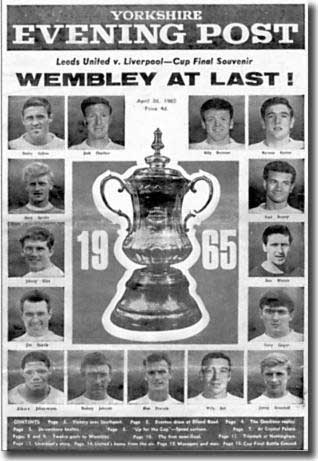 Leeds
United were shock challengers for the League title in 1965 but their remarkable
chase for the championship ended disappointingly. After a formidable showing
on their return to the First Division, the Whites
dropped a point in a 3-3 draw at relegated Birmingham City while Manchester
United beat Arsenal 3-1 at Old Trafford to settle matters, with Leeds
finishing runners up by dint of a much inferior goal average.
Leeds
United were shock challengers for the League title in 1965 but their remarkable
chase for the championship ended disappointingly. After a formidable showing
on their return to the First Division, the Whites
dropped a point in a 3-3 draw at relegated Birmingham City while Manchester
United beat Arsenal 3-1 at Old Trafford to settle matters, with Leeds
finishing runners up by dint of a much inferior goal average.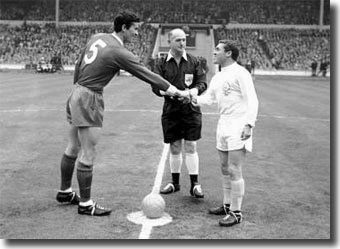 the Duke of Edinburgh noticed them and pointed it out when he was introduced
to the teams before the game!'
the Duke of Edinburgh noticed them and pointed it out when he was introduced
to the teams before the game!'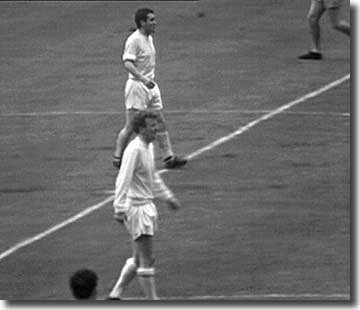 would
take the cause of the black footballer in Britain to fresh heights. He
could have cemented his reputation as one of the most exciting wingers
in the game, but he seemed overwhelmed by the occasion. He was the one
player in the Leeds eleven who could excite crowds, but Liverpool handled
him superbly, with Lawler sitting deep and waiting for the South African
to commit himself. The normal outcome was the ball bouncing loose and
Lawler picking off his man.
would
take the cause of the black footballer in Britain to fresh heights. He
could have cemented his reputation as one of the most exciting wingers
in the game, but he seemed overwhelmed by the occasion. He was the one
player in the Leeds eleven who could excite crowds, but Liverpool handled
him superbly, with Lawler sitting deep and waiting for the South African
to commit himself. The normal outcome was the ball bouncing loose and
Lawler picking off his man.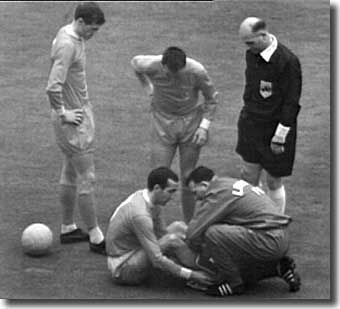 and
Liverpool did not play like this because they were at Wembley. Rather,
they were at Wembley precisely because they play like this.
and
Liverpool did not play like this because they were at Wembley. Rather,
they were at Wembley precisely because they play like this.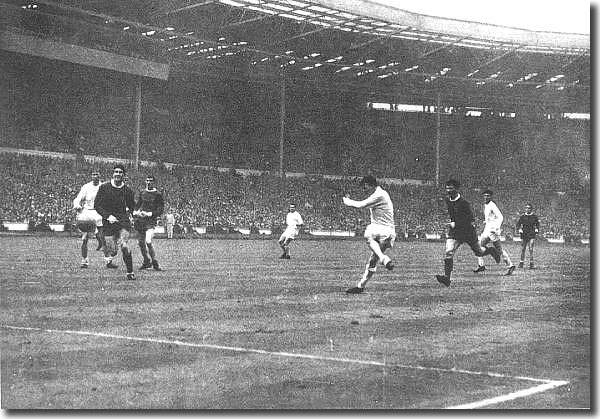 It
never seemed likely, though, that there would be a goal in a drab first
half.
It
never seemed likely, though, that there would be a goal in a drab first
half.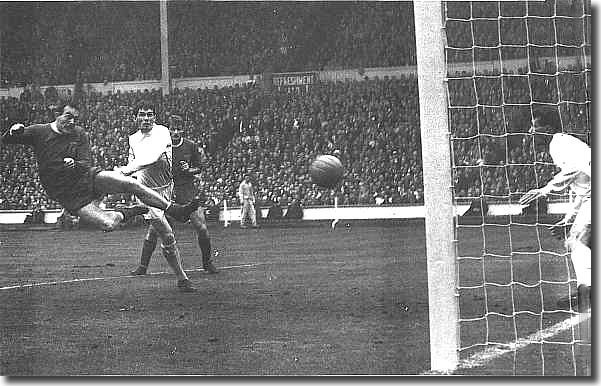 that the break had disturbed United's concentration. Stevenson slipped
through a number of tackles as he danced deftly towards the edge of the
Leeds area. He slid a delightfully incisive through ball to the overlapping
Byrne on the left. The full-back's clipped ball from the byline was met
by a stooping Roger Hunt, who nodded it in to send the Reds' fans into
raptures. The police carried one of their supporters off after he celebrated
a little too enthusiastically.
that the break had disturbed United's concentration. Stevenson slipped
through a number of tackles as he danced deftly towards the edge of the
Leeds area. He slid a delightfully incisive through ball to the overlapping
Byrne on the left. The full-back's clipped ball from the byline was met
by a stooping Roger Hunt, who nodded it in to send the Reds' fans into
raptures. The police carried one of their supporters off after he celebrated
a little too enthusiastically.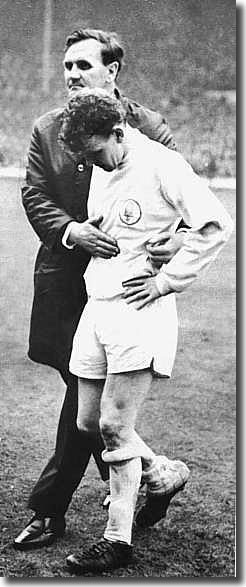 best out of Sprake, doing wonders
to tip it round the post as he dived to his right.
best out of Sprake, doing wonders
to tip it round the post as he dived to his right.